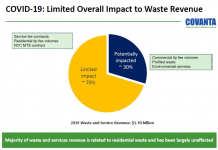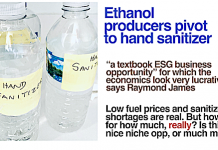Author Neal Dikeman is a founding partner at Jane Capital Partners LLC, a boutique merchant bank advising strategic investors and startups in cleantech. He is the founding contributor of Cleantech Blog, and a Contributing Editor to AltEnergyStocks.com. Quick, what do Ethanol, NAFTA, Mexican Tortillas and Walmart have in common? Don’t know? Well here’s the story. I am fascinated by the discussion about ethanol feedstocks issues. There has been a lot of talk about corn production for ethanol either crowding out beef or food production, or driving up the price of food, or failing to supply the demand for ethanol. I have stated before on Cleantech Blog and other sites that I believe corn is a lot more substitutable than the anti-ethanol and cellulosic ethanol advocates give it credit for. Our take: that the corn price rise from ethanol demand will not be as steep as the worst case, that the industry will find more acreage than expected for corn, and that costs will fall, in part because corn producers (and beef producers) are highly flexible and relatively global. Also that cellulosic processes are a lot harder and will take a lot longer to make economic than expected, and that the end result will be corn ethanol for a long time. But the subject just keeps rolling – quoting an Inside Greentech interview with David Aslin of 3i: “Leaving the issue of food substitution out for a moment, as your article pointed out, the sheer acreages that are going to be required are daunting. There was a dramatic increase in 2006 in corn plantings over the prior year, and the industry forecasts an additional 10 million acres in 2007 in response to the need for fuel. How much of that is going to be available for food if all these ethanol plants being constructed actually come online, and at what price? (Heck, there’s way too much corn syrup in U.S. food industry products anyway, so if we take a bit of the excess sugar out of people’s food, that won’t be a bad thing for the nation’s health!)” At the same time, we have also been saying that corn ethanol is inherently a high cost fuel ($1.50-$2.50/gallon direct cost on a btu basis compared to $0.50-0.60/gallon for gasoline on a direct cost basis – read our blog, and please don’t email me arguing the price of crude is over a $1/gallon, it’s the COST of finding and producing that crude, not the price the oil companies can sell it at, that matters), with lots of new supply coming on that is going to hurt the economics of US ethanol producers like VeraSun, Aventine, etc. But this is a whole new angle – the political ramifications of our ethanol industry driving up prices for our neighbors food supply. One of my friends, the CEO of a fuel cell startup who happens to read Cleantech Blog, emailed me an article today. Basic gist – the Mexican government is concerned that ethanol demand is driving up the price of tortillas! And is trying to decide what to do about it. As they describe the impact: “Prices for white corn used to make tortillas have been hit the hardest. Although local corn prices are typically volatile around harvest time, which mostly falls in the second half of the year, traders say the farm gate price for white corn saw an unprecedented rise of up to 45 percent in 2006 compared with the year-ago levels in the Mexican market. Grains traders have forecast tortilla prices to rise between 20 percent and 25 percent during the last quarter of 2006 and the first quarter of 2007. ” My friend’s commentary on the subject: “Even more funny, in the story I heard on NPR, Wal-Mart Mexico is taking advantage of the tortilla price run up to undercut independent tortilla shops. But besides the humor, there may be something here. I think the Mexican government is just out in the lead. I’ve seen at least one piece predicting that additions to ethanol production have been under estimated and that significant corn feedstock shortages will occur in 2008.” Now, nobody’s talking NAFTA yet, but one of the things free trade does is globalize commodities. I’m just waiting for the next reverse “giant sucking sound” attack on NAFTA to follow this corn price rise. Or worse, some blogs are bound to start complaining that corn ethanol is racist, and anti-Mexican. To an economist like me, this price rise is just a perfect example of how globalization can even out the impact of something like ethanol demand on corn prices by spreading the effect across multiple markets and multiple commodities (and drive a new energy commodity export business – see our recent blog) – an example of my point that corn ethanol has longer legs than the cellulosic guys would like. But I’m sure that’s not how it’ll get reported. Though you do have to admit – our ethanol craze could make Mexican tortillas too expensive to eat? That’s kind of funny.









I doubt that the Mexicans would consider it funny — they are deadly serious about corn issues (example: Goggle “biotech” “GMO” + “maize” + “Mexico” and read the pages upon pages about the controversy in Mexico about American genetically engineered corn purportedly endangering Mexico’s food security).
Maybe there is an angle to this you have not considered. Tortillas are a staple of the Mexican diet, and corn tortillas are central to the diet of the poor in Mexico — the people least able to deal with price rises due to “gloablization evening out the impact” of ethanol demand. More prosperous Mexicans tend to eat (wheat) flour tortillas, if they eat tortillas at all.
I am not advocating this as a reason for the US not to use corn-based ethanol — I think there are plenty of other reasons, economic and carbon-wise, not to. But I hardly think it qualifies as funny.
Personally I think we might be better off removing the tariff and non-tariff barriers to imports of sugarcane-based ethanol. But I doubt the corn lobby will let that happen…
Hi Keith,
I agree 100% with you on the tariffs for sugarcane-based ethanol.
I’ve made my position on corn-based ethanol known before; it think that, besides all of other question marks (e.g. oversupply, energy balance, etc.), one of the big risks facing the industry right now is the threat of an organized campaign against it around the food-Vs-fuel debate.
I am not at all bullish on corn-based ethanol in the long run.
You may have noticed that this article was by our Contributing Editor Neil Dikeman. The best way to get a response from him to your concerns is to post this comment on his blog: http://www.cleantechblog.com/2007/01/ethanol-nafta-tortillas-and-walmart.html
Keith, I agree with your comment. If this were to impact the ability of the poor in Mexico to eat corn tortillas, this is not funny.
Thanks for sharing your views on this.
Is this not a driver for “cellulosic ethanol” …?
Cellulose being the “fibre” undigestable by humans…
I don’t know the Tortia manufacturing process…
So I don’t know if the cellulose is a necessary component… I thought it’d be mainly starch via flour…??
Maybe some “green chemical” separations could enable maximum efficiency use of the food crop. **realising every separation reduces the energy balance – “good green chemical” separation technologies include: membrane-reactor systems or BOG-STANDARD “solvent exchange” (renewable solvents AND dependent on the “good” partioning of the components ease of purification OR no purification needed) – a lot of this is Chemical Engineering – so the chemists and engineers would need to work together on this
I know of projects on this sort of thing… using the “crop” to its maximum extent.
(*not entirely specific to corn – but on Straw… and a separate project I think from corn stalks…)
I’m currently looking for employment actually now in the energy/chemicals sector… good news is there seems to be plenty around globally, but the UK majors all seem to be working OUTSIDE the country which is not great, unless I go into academia
Anyway – interesting points to consider on this FOOD v FUEL DEBATE.
I want to see price effects in Mexico. Many farmers were driven out of business by cheap imports fueling a too rapid urbanization and immigration. If prices return to were these farms become viable, even if only for a few years, it may be helpful in rebalancing resources from the poor urban areas to the dreadfully poor rural areas.
A bit Maoist, but the Zapatistas are a reality.
Higher corn may also increase the competitiveness of grass fed beef and help reduce US meat consumption. I am not a vegetarian, but current amounts hurt the environment and health in a nation (US) where life expectancies may start shrining due to obesity.
There are so many things to balance, though I do not like politically and bubble spec driven ethanol.